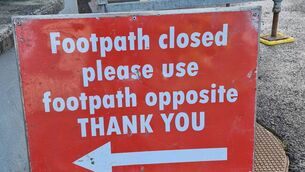Students wanted a change of government

Votes for Mayo poll-topper Rose Conway-Walsh, from Sinn Féin, are piled high at the count centre in the Royal Theatre in Castlebar during the recent general election. Picture: Michael McLaughlin
I was surprised to hear that voter turnout for the recent general election was historically low. In the weeks leading up to polling day on November 29, the election seemed to be the subject of many conversations.
My friends, for instance, were having heated debates in the back of bars about united Ireland and the political agenda of Sinn Féin. However, being a journalism student, it would make sense that I run in politically conscious circles.
I spoke to a few of my friends to see how they voted and why. A University of Galway student hailing from Mayo, who would prefer to remain unnamed, tells me her first and second preference votes went to Sinn Féin candidates.
“I wanted to give Sinn Féin a chance,” she told me. “The Sinn Féin candidates in my local area have done a lot of good.”
Her third preference choice was Fine Gael’s Alan Dillon. She told me that she knows the candidate personally and he has “done some good for Mayo as well".
University of Galway student Donna Gannon’s first preference vote also went to a Sinn Féin candidate. Donna, however, is in the Galway East constituency.
“[Sinn Féin is] the most promising party to bring change to our country, especially for young people,” Donna explained. “Every party has their faults but I think they are a party that is for the people, as opposed to Fine Gael and Fianna Fáil.”
Donna’s second preference vote went to a People Before Profit candidate and her third preference vote went to a Social Democrats candidate.
On the other hand, University of Galway student Jean Daly’s first preference choice was an independent representative from her village.
“His name is Liam Minehan,” Jean said. “I wanted to vote local. One of the main reasons is he wants to develop a rural Ireland and pump investments into the rural communities. He’s a farmer himself, so he knows how important that is.”
Jean voted in the Tipperary North constituency. Her second preference vote went to a People Before Profit candidate and her third to a Labour candidate.
Jean described voting for candidates who pledged to make housing more affordable, promote gender equality and protect the rights of people with disabilities.
University of Galway student Ella O’Riordan gave her first preference vote to a Sinn Féin candidate and her second to a Social Democrats candidate. She is in the Galway East constituency.
“I didn’t [vote for] anyone else because I didn’t want my vote to end up going to Fianna Fáil or Fine Gael,” she explained.
Ella said that her four roommates, also University of Galway students, voted for members of Sinn Féin, Social Democrats, People Before Profit and Labour.
“None of us wanted Fianna Fáil or Fine Gael back again…” Ella said. “Nothing is being done in this country and none of us are happy about it.”
Another University of Galway student from Cork, who would prefer to remain unnamed, gave her first preference vote to a Social Democrats candidate.
“I voted Social Democrats because I agree with most of their policies and what they are going to bring in,” she explained. “I also respect that they are very upfront about who they will go into government with and what they will do… They don’t care necessarily about making promises to be popular, but they are still level-headed and not as extremely isolating as some of the more left parties can be.”
This student’s second, third and fourth preference votes also went to various left-wing parties.
“I didn’t want to vote for Fianna Fáil or Fine Gael because I think it’s time for a change,” she told me.
While this is only a small sample of the student population, the outcome of the 2024 Irish general election does not reflect their opinions and values.
“It’s disappointing because I think people were looking for a change,” the aforementioned University of Galway student from Cork said. “I think the most disappointing thing is that only 60% of the population came out to vote, which is abysmal.”
Many young people in Ireland do care about politics and the future of Ireland. One can only hope they learn the importance of exercising their civic duty before the next election.
“People are more invested in a different country’s politics (America) than they are in their own,” Ella said.
However, she argues that another crucial factor contributes to the low voter turnout.
“Politics is really inaccessible,” Ella explained. “If it was more accessible, maybe more people would have voted and there would have been change. The minute you hit 20 you’re expected to know how it all works and who you’re supposed to vote for and it just doesn’t work like that.”




